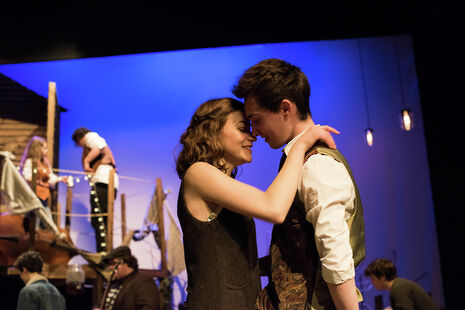Review: The Winter’s Tale
Elizabeth Spence is impressed by this creative production of a Shakespeare classic

In this, the 400th anniversary year of Will Shakespeare’s death, tributes have been paid from Stratford to Shanghai, but here in Cambridge, praise is due to another Will, the director of the CUADC’s invigorating production of The Winter’s Tale. What distinguishes this staging from many, more amateur, student renditions of Shakespeare is the clear artistic vision of Will Bishop and his creative team, who succeed in making the play distinctly their own. The set and costumes feel modern, and the refusal to confine the aesthetic to a specific time period (Leontes sports an Edwardian-style cravat while the Shepherd snaps a selfie), especially in the Bohemian scenes, evokes the slightly fantastical atmosphere necessary for a fake beard to render a father unrecognisable to his son, or for a statue to come to life.
The Winter’s Tale combines Shakespeare’s talents for both tragedy and comedy, and this production does likewise, with a distinct contrast between the stillness of the first scenes and the raucous noise of the second half. In the Sicilian scenes, a family dinner (with very impressive story-telling from the child-actor portraying Leontes’ and Hermione’s son) descends into accusations of adultery and treason. Hermione (Ellen Gage), who had earlier appeared perfectly coiffed and upright, despite her pregnancy, at the head of the dinner table, is subjected to a public trial presided over by her seething husband (Tom Beaven). She is visibly changed by the ordeal, leaning on the witness box for support, her hair dishevelled. A spotlight on Hermione in this scene would have allowed the audience to appreciate the talented performance by Ellen Gage better. Whilst the darkness on her side of the stage could have been a metaphor for Leontes’ refusal to accept her innocence, or to ‘see the light’, it seemed out of place that the servants and courtiers who observed the trial were better lit than their mistress.
When the storm that saw Perdita’s arrival in Bohemia had passed, the stage was awash with colour and the performers were constantly on their toes, picking pockets, stealing kisses and jigging away, Globe-style, to the accompaniment of the live band. Clara van Wel as Perdita and Joe Pitts as Florizel captured the spirit of Shakespeare’s young lovers perfectly, their innocence and playfulness a stark contrast to the troubles of their parents in Sicilia. The delightful comedy duo of the Shepherd and the Clown (Rosie Brown and Henry Wilkinson) created an atmosphere more often experienced at panto time than in the midst of exam term. No wonder Polixenes wanted to go home early, if this is what was waiting for him – I’d swap sitting at a long table staring at a boar’s head for a spot of barn-dancing any day!
It is the final reconciliation scene, when Perdita, Florizel, Polixenes and Camillo return to Sicilia, which poses some problems, both in Shakespeare’s script and in this production. Two worlds collide when guitar-strumming Perdita meets her depressive father, and everyone seems a little too quick to accept various pairings and resurrections. Having Leontes clutching his dead son’s teddy bear was a nice touch, and confirmed the total collapse of his patriarchal power, though more could have been made of the poignant act of placing the said bear at the base of the ‘statue’, a reminder that although Hermione herself has miraculously returned to life, her son has not.
This was a true ensemble performance, though special mention goes to Emma Blacklay-Piech, whose trouser-suited Paulina was the definition of sass, and Jack Gardner, who commanded the stage as the roguish Autolycus. Never work with children or animals, they say. Will Bishop and friends do both, with panache.
 News / Academics lead campaign against Lord Browne Chancellor bid2 July 2025
News / Academics lead campaign against Lord Browne Chancellor bid2 July 2025 News / Clare students call on College to divest3 July 2025
News / Clare students call on College to divest3 July 2025 Lifestyle / It’s pretty fun to talk to strangers3 July 2025
Lifestyle / It’s pretty fun to talk to strangers3 July 2025 Science / It’s only rocket science, Elon3 July 2025
Science / It’s only rocket science, Elon3 July 2025 News / Join Varsity‘s editorial team this Michaelmas23 June 2025
News / Join Varsity‘s editorial team this Michaelmas23 June 2025







